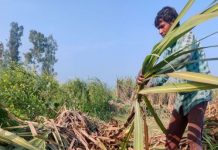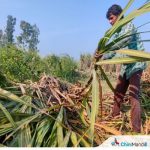New Delhi [India], November 22 (ANI): Prime Minister Narendra Modi-led government’s PM KISAN scheme is a major shift in the nature of government support to farmers in India and is one of the finest examples of the use of digital public goods to reach out directly to the beneficiaries without middlemen.
Launched on February 24, 2019, the PM KISAN scheme is aimed to supplement the financial needs of land-holding farmers — the financial benefit of Rs 6,000 per year is transferred into the bank accounts of farmers. Certain categories of higher economic status farmers are excluded from the scheme.
The release of benefits for any instalment period under PM KISAN has now crossed 10 crore farmers from 3.16 crore for the first instalment period – more than 3 times increase in over 3 years.
Through a span of over three years, it has provided assistance of more than Rs 2 lakh crore to needy farmers. Of this amount, more than Rs 1.6 crore has been transferred since the Covid-induced lockdown.
Taking advantage of the extensive use of digital technologies in the implementation of PM KISAN, the government has also initiated steps for building a digital ecosystem for agriculture or Agristack. This will be another digital public good in the agriculture sector, using PM KISAN data as the basis of a federated farmers database to be maintained by the States, the Ministry of Agriculture and Farmers Welfare said in a statement on Monday.
“The success of this scheme lies in the improvements introduced over time for verification and validation of the farmer details. Mandatory fields have been put in place since inception for the first level check,” the ministry said.
The minister further said there are many studies and findings, which indicate that the PM KISAN scheme has helped farmers towards productive investment in agriculture activities. This, in turn, through a multiplier effect, has contributed to the overall improvement of the agricultural sector.
For instance, in an empirical study conducted in association with ICAR, the International Food Policy Research Institute (IFPRI), found that the scheme has enabled greatly in addressing the liquidity constraints of farmers for buying agricultural inputs. Further, for the small and marginal farmers, it has not only helped them to meet their requirement of funds for farm inputs but also for their daily consumption, education, health and other incidental expenses.
To sum up, PM KISAN has been a game changer in reaching out directly to the farmers in the country, every four months, and in time of their need. (ANI)












